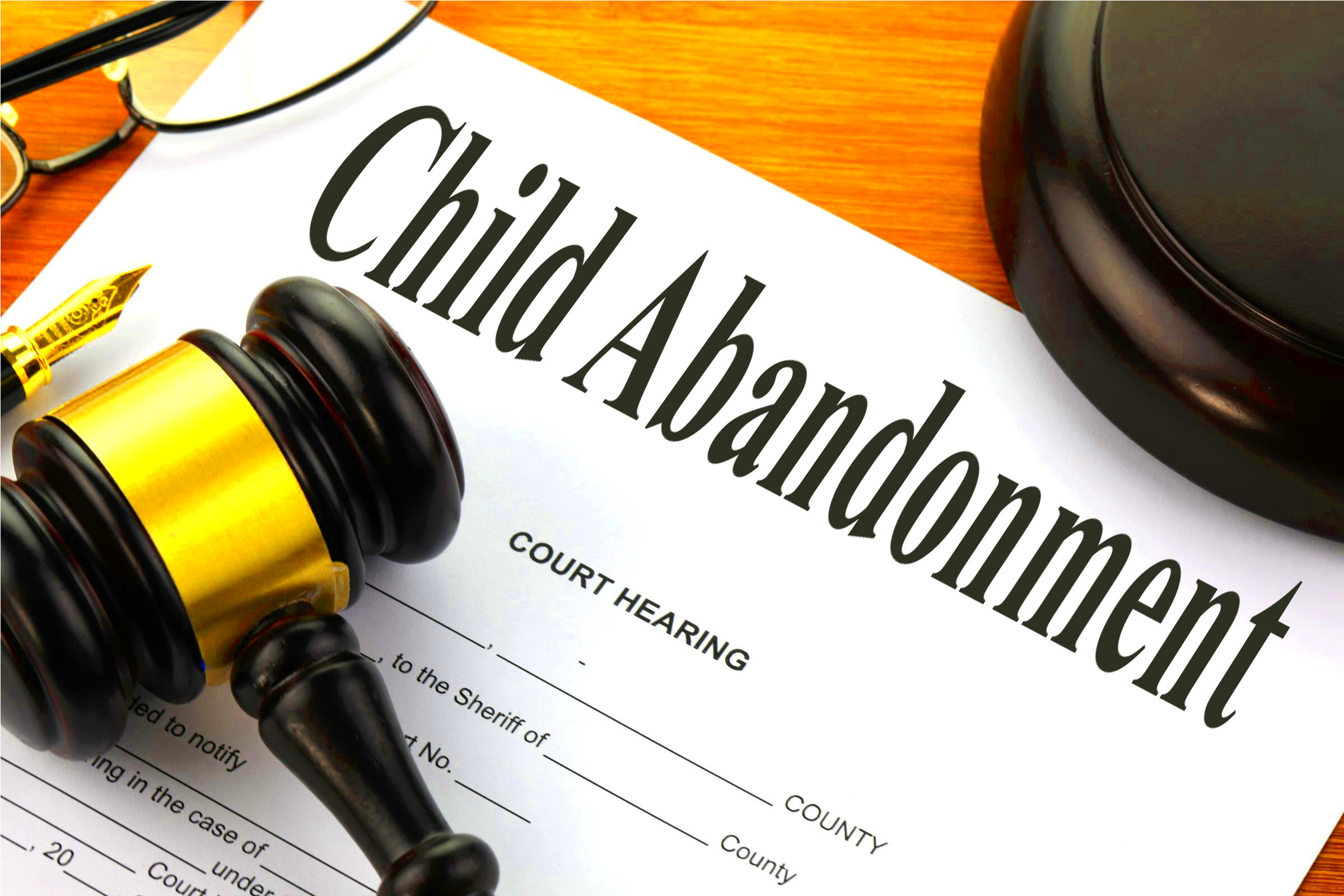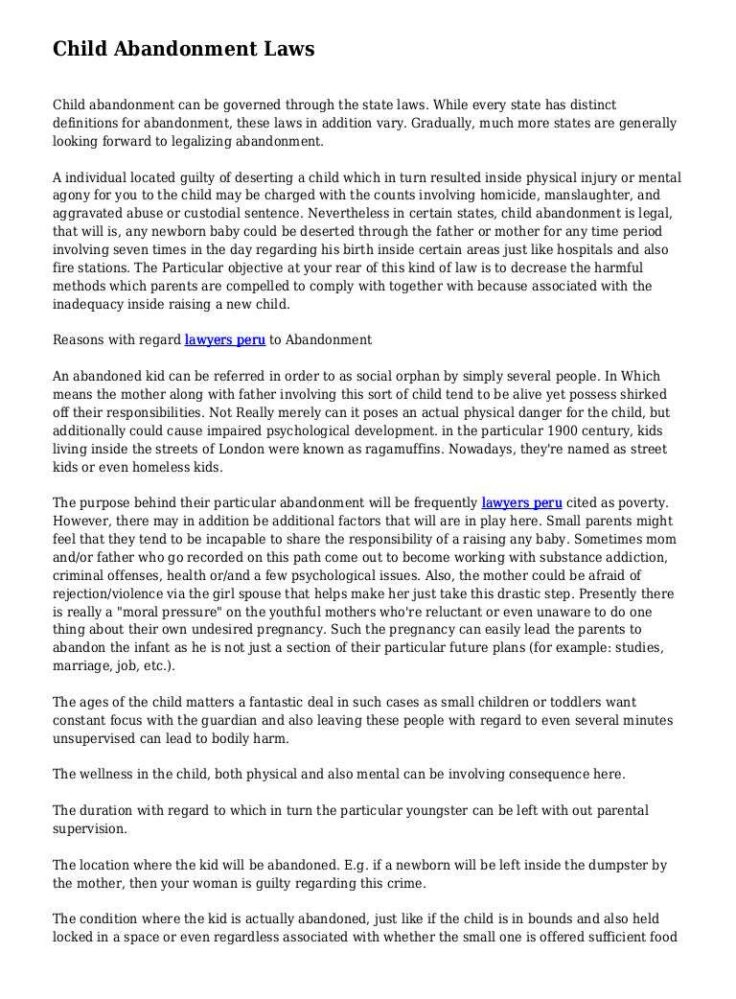Colorado Child Abandonment Laws What You Need to Know
Child abandonment is a serious issue that affects many families in Colorado. Understanding the laws surrounding child abandonment is crucial for parents, guardians, and caregivers. Colorado law defines abandonment and outlines the legal consequences for those who abandon a child. In this post, we will explore the definition of child abandonment, the legal implications, and what you need to know if you find yourself in such a situation.
Definition of Child Abandonment in Colorado

In Colorado, child abandonment occurs when a parent or guardian intentionally leaves a child without adequate care or supervision, demonstrating an intent to sever the parental relationship. This can take various forms, including:
- Leaving a child in a public place without supervision
- Failing to provide necessary care or support for an extended period
- Not maintaining contact with the child
It’s essential to note that abandonment is not solely defined by physical absence. Emotional neglect and failure to provide for a child’s basic needs can also contribute to abandonment claims.
Legal Consequences of Child Abandonment

The legal consequences of child abandonment in Colorado can be severe. Depending on the circumstances, a parent or guardian may face criminal charges or civil actions. Some potential consequences include:
| Type of Consequence | Description |
|---|---|
| Criminal Charges | Child abandonment is classified as a class 2 misdemeanor, which can result in fines and up to 120 days in jail. |
| Civil Liability | Parents may be liable for damages in civil court if abandonment leads to harm or distress for the child. |
| Loss of Parental Rights | In severe cases, a court may terminate parental rights, permanently separating the child from the parent. |
These consequences aim to protect children’s welfare and ensure that parents take their responsibilities seriously. If you’re facing abandonment issues, seeking legal advice is essential to understand your rights and options.
Factors Considered in Abandonment Cases
When a child abandonment case is evaluated, several factors come into play. Courts look at the circumstances surrounding the case to determine whether abandonment has occurred. Here are some key factors they consider:
- Duration of Absence: How long has the parent or guardian been away from the child? A prolonged absence without contact can indicate abandonment.
- Intent: What was the parent’s intention when they left the child? Was there a clear intention to abandon, or were there extenuating circumstances?
- Provision of Care: Did the parent or guardian leave the child in the care of someone reliable? If the child was left with someone capable of providing for their needs, it may impact the case.
- Communication: Has the parent maintained any form of communication with the child? Ongoing contact can demonstrate a desire to remain involved in the child’s life.
- Overall Circumstances: Courts will consider the broader context, including economic hardship, mental health issues, or substance abuse that may have contributed to the situation.
Each case is unique, and the court will weigh these factors carefully to ensure the best outcome for the child involved.
Rights of Parents and Guardians
Parents and guardians have specific rights concerning their children, even in cases of alleged abandonment. Here are some essential rights to remember:
- Right to Legal Representation: Parents can seek legal counsel to help navigate abandonment claims and protect their interests.
- Right to Fair Hearing: Every parent deserves a fair hearing where they can present their side of the story before any decisions are made.
- Right to Maintain Contact: Parents have the right to maintain contact with their child, provided it’s safe and in the child’s best interest.
- Right to Reunification Efforts: Parents have the right to be involved in reunification plans if their child has been removed from their care.
Understanding these rights can empower parents and guardians to take appropriate actions to protect their relationships with their children and seek necessary legal remedies.
How to Report Suspected Abandonment
If you suspect that a child is being abandoned, it’s crucial to act swiftly to protect the child’s welfare. Here’s how you can report suspected abandonment:
- Contact Local Authorities: If you believe a child is in immediate danger, call 911 or your local police department.
- Child Protective Services: You can report suspected abandonment to your local Child Protective Services (CPS) office. They investigate cases of abuse or neglect.
- Provide Details: When reporting, be prepared to share specific details, including:
- Child’s name and age
- Location of the child
- Observations that led to your concerns
- Anonymous Reporting: Many states, including Colorado, allow anonymous reporting, so you can share your concerns without revealing your identity.
Reporting suspected abandonment can be a daunting task, but it’s vital for the safety and well-being of the child. Remember, taking action can make a significant difference in a child’s life.
Resources for Affected Families
If you or someone you know is facing issues related to child abandonment, it’s essential to have access to the right resources. Several organizations and services can provide support, legal assistance, and guidance to families in need. Here are some valuable resources:
- Local Child Protective Services: Every county in Colorado has a CPS office where families can seek help and report concerns about child welfare.
- Legal Aid Organizations: Non-profit legal aid groups offer free or low-cost legal services to families dealing with abandonment or custody issues. Some options include:
- Colorado Legal Services
- Family Law Facilitator’s Office
- Support Groups: Connecting with others who are going through similar situations can provide emotional support. Organizations like the National Parent Helpline offer resources and peer support.
- Counseling Services: Therapy can help families navigate emotional challenges. Many community organizations provide counseling specifically for families dealing with abandonment or neglect issues.
These resources can be a lifeline for affected families, offering guidance and support during difficult times.
Frequently Asked Questions
When it comes to child abandonment laws and issues, many questions arise. Here are some frequently asked questions that can help clarify common concerns:
| Question | Answer |
|---|---|
| What constitutes child abandonment? | Child abandonment involves leaving a child without proper care or supervision and showing an intention to sever the parental relationship. |
| What should I do if I suspect a child is being abandoned? | Contact local authorities or Child Protective Services to report your concerns. |
| Can I remain anonymous when reporting abandonment? | Yes, many states allow for anonymous reporting to protect the identity of the person reporting. |
| What rights do parents have in abandonment cases? | Parents have the right to legal representation, a fair hearing, and the opportunity for reunification efforts. |
Conclusion and Key Takeaways
Understanding Colorado child abandonment laws is crucial for parents, guardians, and caregivers. Here are the key takeaways to remember:
- Child abandonment is a serious issue with legal consequences that can significantly impact families.
- Several factors are considered in abandonment cases, including the duration of absence and the intent behind it.
- Parents have rights that can help protect their interests during legal proceedings.
- There are numerous resources available for families affected by abandonment, including legal aid and support groups.
- Always report suspected abandonment to local authorities to ensure the safety and welfare of the child.
Being informed about these laws and resources can help protect the rights of families and ensure children receive the care they need. If you have further questions, don’t hesitate to reach out for support or legal guidance.


